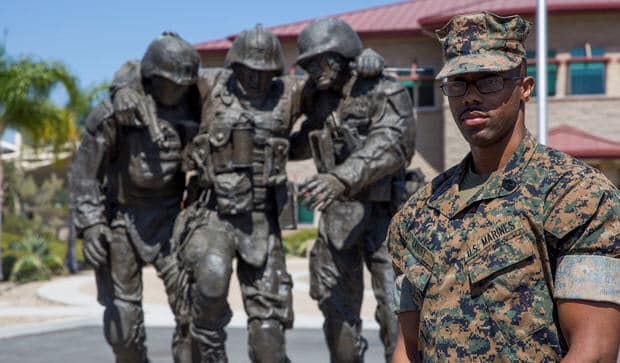
By Lance Cpl. Noah Rudash | Marine Corps Base Camp Pendleton
MARINE CORPS BASE CAMP PENDLETON, Calif. —
A native of Baton Rouge, Louisiana, 1st Sergeant Michael Landry graduated high school in 2001, and earned the title Marine shortly thereafter. Becoming a Marine, Landry knew it would be a promise he once made to his mother to “become a better person.”
Landry spent 13 years in the Marine Corps as a radio chief, and when he returned home from his last deployment to Afghanistan in 2014, his doctors noticed a slight change in his vision. Unaware of any diagnosed vision issues, he executed orders to Okinawa, Japan and within one year was experiencing drastic eyesight changes.
“My eyesight had changed so much I couldn’t even get glasses fast enough,” he said. “I’d go to optometry, get a prescription and before that prescription came in, I already needed a stronger prescription. No one could diagnose what exactly was going on.”
Landry’s eyesight had in fact deteriorated to the point where he redeployed from Japan, and checked into Wounded Warrior Battalion-West to receive treatment to aid in his recovery, and by November of 2015, Landry was 100% clinically blind.
“The disease is called Keratoconus,” Landry said. “It’s an eye disease that makes your cornea thin out to the point where you can’t see anymore.”
To work through his condition, Landry began to sew which eventually lead him to starting his own clothing line business.
In addition to his first business initiative, Landry also created his own record label. This business venture helped battle an ongoing depression that stemmed from as he describes, moving from the position of leadership as a Gunnery Sgt. down to [what felt like] a private; “in charge of no one.”
“I knew nothing about music and nothing about clothes,” Landry said. “So I learned everything I could, and dove right into it, head first.”
In September 2016, Landry received a cornea transplant for his left eye, and in February 2018, an additional transplant for his right eye. Landry said, “The transplants have helped but my eyes are still slowly digressing.”
After the transplants, Landry was able to see with glasses however, he still fights through his recovery process, and credits his businesses for what has helped him the most through difficult times.
“Marines learn how to shoot, move and communicate,” he said. “We don’t learn how to be injured or hurt. Depression is a real thing; it sets in. In order to fight depression and PTSD I started businesses. You have to find something to take your mind off of what you’re actually going through. That’s what I do. I just re-focus all of my energy and attention on something separate so I don’t have to sit and think about the trouble I have seeing.”
Losing any one of your five senses is traumatic, and Landry never lets his battle with sight bring him down. Whenever and wherever possible, he uses his story to inspire others and help build others see things differently in their times of need.
“What stands out most about 1st Sgt. Landry, you would never know he’s going blind,” said U.S. Marine Corps Sgt. Maj. Mario Fields, sergeant major, WWBn-West. “He doesn’t walk around with an attitude of ‘why me’. He has this attitude of ‘okay, you know what, I’m not the same person I was a year ago or two years ago. Now I’m the new me with this disability. I’m going to embrace the new me and be the best new me I can be.”
Landry also started a non-profit organization that helps feed the homeless on the first Saturday of every month.
In Landry’s future, he wants to continue to grow his businesses and has hopes of helping people by using his story. He was also nominated and offered a position as a motivational speaker.
“Don’t let whatever your limitations are hinder you from being who you feel you should be,” said Landry. “Everyone has bad days, everyone has depression, and everyone has stress but how you deal with those things will make you who you are.”

















